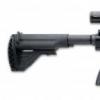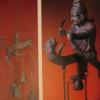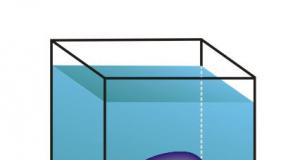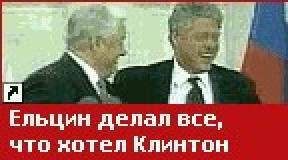A new look at national military strategy. Major General Alexander Vladimirov answers questions about military reform (section closed)
Major General Alexander Vladimirov answers questions about military reform (section closed)
Alexander Ivanovich Vladimirov - reserve major general, vice-president of the College of Military Experts of Russia, member of the National Strategy Council, candidate of political sciences.Born April 17, 1945. Graduated from the Moscow Suvorov Military School, Moscow Higher Combined Arms Command School (1966), Military Academy named after. M.V. Frunze, Military Academy of the General Staff of the USSR Armed Forces.
He served in the Far East, in the Group of Soviet Forces in Germany, in Belarus, in Vietnam. Recipient of 20 state awards.
He took part in the development of the “Fundamentals of the Military Doctrine of the Russian Federation”, the laws of the Russian Federation “On Defense”, “On Security”, “On the Status of Military Personnel” and other legislative acts.
21.03.2012
Nakhimov School
Good afternoon. Alexander Vladimirovich. We are not a military family, my son is growing up, I want to send him to the Nakhimov School. I am making every effort to be smart, athletic, in general everything that a real Nakhimovite should be. I want him to begin the life of a naval officer. But they don’t take civilians. What should we do then? Thanks in advance. Author of the question: Safiulina Elena Yurievna
27.06.2009
Reform
What will operational commands be like and their features in relation to the Navy. Author of the question: Saik A.P.
25.05.2009
Training after 5 years of institute
Dear Alexander Vladimirov! Answer this question. Is it possible to study at naval institutes (or any other) if you have previously received a higher education? If yes, in which institutions and what is required for this.
Thank you in advance. Posted by: Vladimir
24.05.2009
Hydrography
Are we needed (who, why, how, where, where) if not, then why? Posted by: Sasha
29.04.2009
regarding the arrival of girls
Hello, Alexander Vladimirovich!
This year I heard that girls can apply to you! This is true?!
If this is so, then what is needed for this?!
I live in Vladivostok, I study at college, at VGUES. For a marketer. I'm getting my diploma this year! and now I have a great desire to join you!!!
please tell me how... Author of the question: Julia
25.04.2009
about military pensioners
Why did they forget about military pensioners during the military reform? I, senior midshipman of the Northern Fleet, am currently receiving a pension in the amount of 5,600 rubles in my hands - and already taking into account the “northern interest”. Perhaps the Ministry of Defense does not know that not all pensioners of the Armed Forces are colonels? Author of the question: Viktor Sushkov
22.04.2009
Distribution
Dear Alexander Ivanovich!
This year, 2009, my son is finishing his internship in surgery at the Military Medical Academy named after. S.M.Kirova (St. Petersburg), lieutenant of medical service. I would like to ask you: will he be employed in the military (he has a naval faculty)? Since there are rumors that military doctors will be removed from the staff and transferred to the reserve from the RF Armed Forces without signing a contract with them.
With respect, reserve major, participant in combat operations in the DRA, Vasily Nikolaevich Gubin. Author of the question: Gubin Vasily Nikolaevich
18.04.2009
Personal
Dear Alexander Vladimirovich, I am writing to you with a personal request. In the 90s, my husband and I served in the West Group under the command of Nikolai Sidorov. Unfortunately we lost contact with him. We know that some time ago he served as Commander of the Coastal Forces of the Pacific Fleet. We ask, we simply beg, to help us contact him. At one time we were very friendly and retained the best memories of him. Please pass on our address: Vyborg, Leningrad region Leningradskoe highway, house 12, sq.2
E-mail: K [email protected]
[email protected]
Mobile phone: 8 921 64 99882
Sincerely
Kosyak Elena Alekseevna
Author of the question: Kosyak Elena
17.04.2009
Reform
Hello Alexander Vasilievich.
I would like to ask this: does the Minister of Defense of the Russian Federation have any relation to the management of the Armed Forces of the Russian Federation or is it simply or “looking” from the Supreme Commander-in-Chief? And if so, what kind of service experience (commanding units, formations, associations.....) does Syurdyukov have, what academies did he graduate from?
A lieutenant platoon commander was trained for four years at a military school (under Catherine the Great, a nobleman was enlisted for service even before birth and he was born with the experience of a ready-made platoon commander - maybe we can introduce this in the reform process)), and how much did they train the Ministry of Defense and where? I am a captain of the 2nd rank of the reserves, but I wouldn’t be able to sell furniture - even if I really wanted to - I don’t have enough education and experience, and here on the scale of the Armed Forces one-sixth of the landmass - so it begs the question - do these Armed Forces of the Russian Federation exist, which have been reforming for fifteen years now? ?Or maybe they have already been reformed to the point of complete disappearance, and they are fooling us and cheating us out of taxes?
With respect, captain 2nd rank reserve Chukhontsev Sergey Vasilievich. Author of the question: Sergey Vasilievich
03.04.2009
Responsibility for reformation
Alexander Ivanovich, hello!
There have been reports in the press about the possible removal of Mr. Serdyukov from the post of Minister of Defense of the Russian Federation. The reason is obvious – overzealousness in “reformism”. It is clear that ambiguity could not exist forever, in which the President declares one thing about reform, and the “would-be reformers” do who knows what in troubled waters. It would be good if this “breaking wood” stops, but again, most likely, no one will answer for their outrages. At the same time, reform of the Army is needed, and real reform.
Theoretically, it is clear that the reform should have specific and well-known authors, who should bear responsibility for its outcome. But what, in your opinion, is NECESSARY AND SUFFICIENT to be done in practice so that this responsibility this time is real, tangible, i.e. one that would guarantee a competent, professional, comprehensive, patriotic approach to the development and implementation of such a necessary reform for the country’s Armed Forces?
Thank you.
2.04.09
Author of the question: Captain 2nd rank reserve Shevchenko V.A.
28.03.2009
Economic aspect
Hello, Alexander Ivanovich.
In general, it is clear that defense spending is classified information.
But, if possible, please clarify whether there are “in nature” serious (or at least not very) calculations of the cost of this or that option for reforming the RF Armed Forces, if, of course, there are “in nature” the options for carrying out the reform.
Thanks in advance,
Vymorkov I.F., captain 2nd rank reserve. Author of the question: Vymorkov I.F.
27.03.2009
mercenaries
Are mercenaries really better than an armed people (meaning a conscript army) and isn’t this a danger for the citizens themselves and the state? Can civic duty be a profession? Author of the question: Sergey Vasilievich
1 - 12 of 12
Home | Prev. | 1 | Track. | End | All
In this section, the opinion of the editors of the Central Naval Portal does not necessarily coincide with the opinion of the author of the article or the interviewee. We consider it important and necessary to convey to readers the point of view of anyone, if it has a reasoned basis.
VLADIMIROV ALEXANDER IVANOVICH
Major General of the Reserve.
Born on April 17, 1945 in the family of a military man. Hereditary, over many generations, officer. Russian.
Education:
Moscow Suvorov Military School (1963);
Moscow Higher Combined Arms Command School - with gold medal
medal (1966);
Military Academy named after. M.V. Frunze – diploma with honors (1977);
Military Academy of the General Staff of the USSR Armed Forces – diploma with honors (1984).
Specialty - higher operational-strategic management.
Candidate of Political Sciences.
He served in the Far East, in the GSVG, in Belarus, in Vietnam.
During his service in the ranks of the Armed Forces of the USSR, he passed all command and staff positions from the commander of a motorized rifle platoon, to the chief of staff - first deputy commander of the combined arms army, constantly serving in deployed combat units.
For outstanding achievements in service:
twice received regular military ranks ahead of schedule (“captain”, “lieutenant colonel”);
in 1979, for success in combat and political training and skillful command of the 411th motorized rifle regiment of the 5th Combined Arms Army of the Far Eastern Military District during the strategic maneuvers “Vostok-79” (which were in the nature of the USSR’s reaction to Chinese aggression against the Republic of Vietnam), he was awarded the Order “For Service to the Motherland in the Ranks USSR Armed Forces" III class;
in 1985, at the end of the year, the 35th motorized rifle division of the 20th Combined Arms Army of the GSVG, which he commanded, was recognized as the best in the USSR Armed Forces and the division was awarded the Challenge Red Banner of the Commander-in-Chief of the Ground Forces of the USSR Armed Forces;
in 1988, following the results of the strategic exercises “Autumn - 88”, the 28 Combined Arms Army of the BVI and its Army Headquarters, by order of the USSR Minister of Defense, Marshal D. T. Yazov, were recognized as the best in the USSR Armed Forces.
Awarded 20 state, departmental and foreign awards.
Worked as: Assistant to the USSR Minister of Defense on military reform; Military Advisor to the Supreme Council of the Russian Federation; Head of the Department for Analysis of Problems of the Armed Forces and the Military-Industrial Complex of the Analytical Directorate of the President of the Russian Federation; Advisor to the International Fund for Economic and Social Reform (Reform Fund); General Director of the publishing house "Military Parade"; senior researcher at the Institute of USA and Canada, Russian Academy of Sciences.
Currently - Vice-President of the College of Military Experts of Russia, Vice-Chairman of the All-Russian Union of Cadet Associations "Open Commonwealth of Suvorov, Nakhimov and Cadets of Russia", Chairman of the Moscow Suvorov-Nakhimov Commonwealth, Member of the National Strategy Council, Senior Researcher of the Institute of Economics of the Russian Academy of Sciences, Chairman National Council of the Party “For Our Motherland!”, Member of the Public Chamber of Education in Moscow.
Participated in the development of the “Fundamentals of the Military Doctrine of the Russian Federation”, the Laws of the Russian Federation “On Defense”, “On Security”, “On the Status of Military Personnel”, “On Conversion”, “On Veterans”, Messages of the President of the Russian Federation to the Federal Assembly of the Russian Federation on National Security, the Concept of National security of the Russian Federation, “Fundamentals of the strategy for national security and development of Russia 2050”.
Author of more than 120 works and publications on the problems of the national state idea, military reform, reform of the Armed Forces, civilian control over the security forces of the state, on problems of international, regional and national security, national strategy, on problems of state building and management, as well as five monographs : “On the national state idea of Russia”, “Military reform in Russia”, “Strategic studies”, “Theses on the strategy of Russia”, “Conceptual foundations of the national strategy of Russia. Political aspect"; six almanacs “Cadet Bulletin of Russia”.
Today: Leads the cadet movement in Moscow and Russia, leads the fight to save the national Suvorov military school, works to create a system of cadet education in Russia; actively participates in the construction of the party “For Our Motherland!”; conducts active journalistic, patriotic educational work and scientific work, works on the fundamental work “Fundamentals of the General Theory of War”.
Married, has four children and three grandchildren.
***
FOR REFERENCE
Major General Alexander Ivanovich Vladimirov is the first officer of the Soviet Army who:
in 1986, while still the commander of the 35th motorized rifle division of the 20th Combined Arms Army of the GSVG, he formulated general approaches and specific directions for military reform in the USSR;
contrary to the wishes of the USSR Minister of Defense, Marshal D. T. Yazov, he achieved their publication in the magazine “Military Thought” No. 10, 1988, in the article “Reflections of a combined arms commander” and an all-army discussion of his ideas in the USSR;
then, his main ideas for military reform were published in the book “Army and Society” in 1990;
for which in 1990, from the post of Chief of Staff-First Deputy Commander of the 28th Army BVO, he was sent “to correct the spirit” to Vietnam, where for a year he successfully commanded a group of Soviet military advisers and a group of national troops in one of the neighboring countries.
After arriving from Vietnam in the spring of 1991 and his personal conversation with the USSR Minister of Defense, Marshal D.T. Yazov, in July of the same year he was dismissed from the ranks of the USSR Armed Forces without announcing the reasons.
After the putsch, Major General Alexander Vladimirov was reinstated in the army and served as Assistant Minister of Defense of the USSR (Air Marshal E. I. Shaposhnikov) for military reform.
At the end of 1991, he made a report and initiative to reform the Armed Forces of the USSR, implementing his ideas through the creation of a new military organization of the country, as the strategic basis of the United Armed Forces of the Commonwealth of Independent States (similar to NATO), for which in 1992, at the age of 47, he was dismissed from the CIS Armed Forces (!) due to illness.
In 1993, he personally presented his report “Fundamentals of the Military Policy of the Russian Federation” to the first President of Russia B.N. Yeltsin, which was highly appreciated by the President of Russia, after which he accepted A.I. Vladimirov into his Administration.
Attempts to reform the Armed Forces of Russia from the heights of the Administration of the President of Russia, in which A.I. Vladimirov worked as the Head of the Department of Problems of the Armed Forces and the Military-Industrial Complex of the Analytical Directorate and a member of the Expert Council under the President of the Russian Federation, did not lead to positive results; in the late 90s he was fired “due to staff reduction”, but then, until 2006, he worked as an adviser to the Secretary of the Security Council of the Russian Federation.
Today, that is, almost twenty years after the publication of his ideas and the ideas of other outstanding military experts, such as Vitaly Vasilyevich Shlykov, military reform has begun in Russia, corresponding to their approaches and ideas.
This one concerns: the idea of teams; military police; legal and economic independence of units and formations; optimization and standardization of military uniforms and military equipment; reducing the mobilization burden on the economy and troops; creating units of constant combat readiness; issues of training junior commanders; creating the institution of officers' meetings of units; issues of the new personnel policy in the army and the new Regulations on military service for officers; a new calculation of the salary of military personnel and solutions to their housing problems; tasks and composition of the Branches of the Armed Forces, the Organized Reserve and the Commands of the troops of strategic directions; issues of civilian control and demilitarization of the country; issues of state ideology and ethics of military service; formation of a new quality of professional military education, and so on.
In his opinion, today's reformers are almost exactly copying what he wrote twenty years ago, but the work is being conducted so unprofessionally and with such idiotic methods that even a necessary and useful work turns into its opposite.
***
Dear Colleagues!
I am grateful to the editors of this respected publication for discussing the most pressing issue in the life of our Armed Forces and for inviting me to this round table, as the “unnamed father” of military reform in Russia.
It seems to me that today it is important not so much to talk about the oddities of the ongoing reform and its glaring shortcomings, but to try to understand why it began and is being carried out in this way and not otherwise, and also to think about what we should all do to ensure that the situation the army and the country would improve, our suffering would not have been in vain, and Russia would have received an Army worthy of its greatness.
Now to the heart of the matter.
It seems to me that it is very important for the Russian public to know and understand the background of this military reform.
We must admit to ourselves that by the time the military reform began, that is, by 2008, the Russian Armed Forces were practically incapacitated, ineffective and practically uncontrollable military organization, the real state of which no one knew.
The absolute number of military organisms were completely uncombat-ready units, our arsenals were filled with old equipment and ammunition that could never be used, the bulk of the officer corps was not concentrated in combat units, and the general paradigm of “total mobilization” of military development was focused on so that in a new war we can try to defeat the new quality of the enemy with our old numbers.
Our armed forces were simply poorly armed, and their personnel not only did not engage in combat training, but simply professionally degraded, moreover, this applied to both soldiers and sergeants, and officers and generals.
The domestic industry was not able to produce military equipment even of old models. Since the “kickback” to officials when placing a state order amounted to 50% of the amounts allocated for its production, the Russian military-industrial complex practically stopped fighting even for the state defense order.
Our lag behind the United States and NATO in the military sphere has become catastrophic and almost irreversible.
All military ministers of defense of Russia who worked in this position before A.E. Serdyukov were practically unable to take effective steps to eliminate this situation and, being bogged down in political and corporate “squabbles,” did not even make such attempts.
We practically could not wage a war of any level, which was only confirmed by the war with Georgia.
The need for military reform became obvious to everyone, as well as the fact that it must be radical and comprehensive, and it became impossible to delay its implementation any further.
By this time, it turned out that there were no plans for reforming the military sphere in the state, and the personnel of the leading military personnel were so incapacitated and had no idea what and how to do, that it was impossible to entrust them with carrying out a radical military reform, since this time, the armed forces, as a system, rotted “from the head and from the inside.”
This was the general background of the beginning of the reform of the Russian Armed Forces and, as we see, it was absolutely catastrophic.
Therefore, the political leadership of the country chose the option of a civilian minister and the civilian Ministry of Defense of Russia, which, in our opinion, was absolutely correct.
At the same time, the model of the US armed forces was immediately chosen as the main model to follow.
That is why an absolutely civilian person was appointed Minister of Defense - A. E. Serdyukov, who received complete carte blanche to carry out the reform from the highest political leadership of the state, and N. E. Makarov was appointed Chief of the General Staff of the Russian Federation, who immediately and forever began to share all the views of his minister.
***
It seems to me that from the point of view of correctness and completeness of coverage of the problem of the military reform ongoing in Russia and answers to the questions posed at the round table, it is advisable to expand on this topic somewhat more broadly.
Therefore, let me begin with a thesis listing and disclosure of some theoretical issues and existing basic approaches to reform that identify systemic errors and difficulties of this process.
Firstly. Today in Russia there is not a military reform, but a reform of its Armed Forces.
There is a fundamental difference and a fundamental difference in this.
Military reform, by definition, involves obtaining a new quality in the entire sphere of national defense and the military organization of the state, that is, all law enforcement agencies of Russia, the entire military-industrial complex, the information and social components of the military aspect of the nation’s existence, and so on.
Military reform is carried out on the scale of the entire country and all spheres of the state’s existence, being its most important national task.
Reform of the armed forces is only part of the military reform of the state, as reform directly and only of the Armed Forces of the Russian Federation themselves, that is, only those elements of the military organization and national defense of the country that structurally belong to the Ministry of Defense of the Russian Federation.
Moreover, this is also a matter for the entire nation, which must be carried out with all its might and under its control.
Secondly. The most important and strategic mistake of the political leadership of the state was the provision of complete carte blanche to carry out the reform of the armed forces to the Ministry of Defense itself, which, by definition, is unacceptable, since the nation, that is, the state, and not the department, must reform its security sector.
Unfortunately, this decision was made deliberately by our senior political leadership. Therefore, only it bears full responsibility for the progress, quality and effectiveness of reforms, and only it can radically change the situation.
Third. The complete lack of civilian control over the actions of the reformers, the complete lack of control and anonymity of the activities carried out led to the complete irresponsibility of its anonymous leaders and executors, which, in turn, created an atmosphere of permissiveness and a corrupt environment even in the troops.
Fourthly. The entire national military sphere and even the troops themselves are being purposefully and rapidly traded, which has a disastrous effect on their morale and combat readiness. The leaders of military organizations try to squeeze the greatest personal benefit out of the powers and opportunities available in the service, and general and merciless everyday corruption has become a condition of service for officers and sergeants of the armed forces.
Fifthly. The depressingly low professional level of the authors and implementers of the reform has become clear, and sometimes the complete disregard for the Army, its traditions and the genetic foundations of military service, simply and deliberately demonstrated by officials of the Ministry of Defense, is simply a tragedy.
At sixth. The reform is being carried out in conditions of complete theoretical emptiness and the deliberate killing of national military thought, as well as the complete collapse of the system of national professional military education.
Evidence of this is the new Military Doctrine of the Russian Federation, which only confirmed that today in government there are neither new ideas nor new people capable of developing a strategic document at the national level.
We have practically nothing to teach our officer corps, since we have neither fundamental nor applied military theories, and modern American, really interesting developments, sound in our reality only like science fiction.
A general theory of war is not developed or studied.
With the artificial destruction of the divisional and army level, the “operational art” has practically been curtailed, since there are no longer any combat subjects and there is no one to carry it out.
Since a modern brigade is nothing more than an overgrown regiment, then modern “tactics”, as part of the art of war, remains nothing more than attempts to find a place for these brigades in the system of combat operations, which again returns it back to the regiment.
In institutions of higher professional military education there are no fundamentally new programs and curricula, and not a single higher educational institution that trains commanders even briefly studies such subjects of humanitarian education as, for example, “Ethics”, “Logic”, “Philosophy”, “ Political Science" and "Fundamentals of World Culture", although only these subjects directly develop a person’s ability to think correctly, instill the general culture of the officer and allow him to correctly position himself in the world.
There simply is no translated foreign military literature, since buying and translating foreign books and magazines is expensive, and there are no military translators anymore, although even in the 50s of the last century such literature was bought, translated and studied.
There is simply no domestic military literature, just as there are no special military publications devoted to the theory and practice of war.
The Internet as a basis for scientific work is not used in any educational institution of the Ministry of Defense, including the Suvorov military schools, and all this is for reasons of maintaining secrecy, which is completely insanity.
Unfortunately, no one is engaged in this general cultural and actually information-scientific component of our military professional education and military science and does not even understand its necessity, although without this there will be no science, and we will continue to train obviously low-quality officers.
We have practically no one to teach our officer corps, since the experience of recent wars, world military experience and even the practice of troops are not studied today, and in military universities they are taught by officers who do not know what a deployed battalion or regiment is, and, moreover, a division or army.
We have practically no place to train our officer corps, since we do not have a modern training, training or training ground base, and the old one is simply, mediocrely and rapidly being sold out.
Seventh. The personnel potential of the Soviet military school turned out to be completely exhausted, and negative personnel selection triumphed in personnel policy.
In other words, people began to come to leadership of the troops who had proven not their ability to competently command troops, but only their personal loyalty to their superiors and economic flexibility.
Today, almost the entire officer corps does not believe its senior military and political leaders, since the truth of life is that the life of an officer in the army is getting worse every day, that the state does not need the Army, no one is going to take care of the officers, and “everyone’s economic survival is the work of everyone."
Eighth. The educational, spiritual and moral component completely disappeared from the training and life of troops.
Today in Russia there is no state ideology of military service, the institution of “educators” turned out to be unsuitable from the very beginning, since no one knows what and how to educate the army today.
An attempt to create a Code of Officer Ethics is a move in the right direction, but in the absence of an accepted state ideology and in the context of feverish attempts by a significant part of the officer corps to survive, preserve and not become lumpen, in the complete absence of at least some meaning and prospects for service, as well as complete unprincipledness military leadership and its desire to enrich itself at the expense of the troops - the rapid effectiveness of this measure is questionable.
As an example, we can state that even the correct thought and desire of the President of the Russian Federation - to pay prize money to officers according to the quality of their service, did not lead to an improvement in its quality, but to its complete opposite, since this huge presidential money is distributed among officers not by the officer assembly of the unit according to their real successes in service, as I suggested, and the unit commander himself divides it among the loyalists.
Ninth. There is no professional military expert community in Russia. There is no independent military-scientific publication in the country (while, for example, there are hundreds of them in the USA), which means there is no platform for military thought, which is one of the reasons for its degeneration.
Without the creation of an independent expert community, any government actions in the direction of state building, military reform and the development of the country's national defense are doomed to failure in advance.
Tenth. Unfortunately, today’s Ministry of Defense and state leadership considers itself to be completely self-sufficient in military matters, that is, sufficiently theoretically prepared and practically skillful to resolve issues of Russia’s direct survival in the modern world alone, that is, without the involvement of independent professionals, which there is an obvious mistake.
Eleventh. Carrying out radical military reform has not become a priority national project. This means that its financing is not of a special nature, and the required 5% of the country’s GDP is still not allocated for the needs of national defense, and there is simply not enough money for reform.
In addition, the funds allocated for the construction of the Army are spent ineffectively and are mercilessly stolen.
***
Based on what has been said, that is, from objective assessments of the origins and real foundations of the ongoing reform, we can talk about its preliminary results and the effectiveness of the measures being taken.
I must state that the Russian public and even the national military expert community still do not have a clear idea of the general intent, scale and depth of the ongoing reform, while its “anonymous fathers” remain unknown.
Society feeds on fragmentary information “from the sites of pogroms,” rare and vague statements by the Chief of the General Staff, with complete and special silence from the Minister of Defense, as well as rumors about what will happen.
The most frequently used term in any official information about military reform is the term “new look of the armed forces”, which is the main goal of the reforms, and which is increasingly not a concept filled with real and understandable content and meaning, but is perceived rather as a kind of “mantra” "
However, upon professional analysis, this “new look” is generally a “vague” concept.
Let's touch only on some of its aspects.
Issues of mobilization. In the “new look,” for example, the mobilization component of the Armed Forces is practically not spelled out in any way.
This means that the army must begin and victoriously end the war with the forces of units (brigades) of constant combat readiness in peacetime, for which they are actually so persistently created, and which, by definition, is impossible even in theory.
At the same time, the new and just signed Military Doctrine already talks about the second - the mobilization component of the armed forces.
There is complete inconsistency in all this, since the mobilization component, in its current understanding, can only consist of all kinds of framed (reduced) units and bases for storing military equipment, deployed to combat strength, for example, in “threatened” period" and victoriously ending the war.
The paradox of this decision is that it is the practical destruction of these reduced-strength units that constitutes the essence of the ongoing military reform.
In addition, even understanding the absurdity of the situation, our General Staff and the Ministry of Defense are not changing the system of reserving the Armed Forces.
They do not introduce the concept of “Organized reserve of branches of the armed forces” as a reserve component and an integral part of the RF Armed Forces, they do not change the non-binding and legally meaningless system - “status of military personnel in reserve” to a legally binding one - “service of military personnel in reserve”, then there are no obvious and necessary professional steps being taken, which alone are capable of correctly and effectively solving the issue of a truly “new look for the armed forces” and solving the problem of creating stronger wartime troop groups.
Issues of training junior commanders. Intensive and long-term training of future contract sergeants at the Ryazan Airborne Division is, of course, not a bad thing.
But, by and large, if the training of a new contract sergeant ends only with this, then there will be no sense, since in order for the sergeant to be consolidated in the troops as an independent and most important category of military personnel, it is necessary to create for them their own service vertical (as , for example, in the US Army) within the framework of which these new sergeants can pursue their careers and resolve all issues of a social nature, which should become the basis of their career motivation.
In this regard, the most outrageous circumstance is the complete and deliberately demonstrated disregard of the Ministry of Defense for the opinion of military experts, public opinion and publications in the media, as well as the complete silence of our highest political state power, which, for some unknown reason, deliberately suppresses the full severity of this, absolutely fateful for our state, issue.
In general, the overwhelming general opinion of Russian society and the army itself is that military reform in Russia is going in the wrong direction, it is being led by the wrong people, the reform is going badly and will end badly for Russia as well.
Probably, in today's conditions, no other conclusion could be expected.
However, is everything really so bad and hopeless?
We know how the reform is officially assessed only from the words of Chief of the General Staff N.E. Makarova. This meager information mainly concerns only a few issues, of which only one has real confirmation, and that is that units of permanent combat readiness have been formed.
All other official information is speculative and hypothetical. For example: that officers will be paid more; that everyone will have apartments; that a new structure for professional military education has been created; that a new generation of sergeants is already training in Ryazan; that new military equipment has entered the troops...
With all our skepticism, we will assume that all this will be so, and these are certain achievements of the reformers.
We see the objective successes of our leadership of a strategic nature in the fact that he succeeded in the main thing - to destroy the shackles of “total mobilization”; more or less understand what is and what is not in the field of national defense; launch (though today they are simply feeble) mechanisms for saturating troops with new military equipment; and also complete “clearing the reform field of the remnants of the Soviet military machine.”
That's probably all.
It is also important that it apparently understands the depth and scale of the necessary transformations and decisions, and now it is concerned that it is necessary to move forward, but at the same time it does not really know what and how to do next.
It became obvious that the instinctive attempts of the political and military leadership to manage the development of the state and army, based almost exclusively on their own ideas (borrowed foreign theories and eclectic approaches) about the essence of the processes of national state building in war conditions, and this is exactly the case, can only lead to the next “convulsions of management” and the next mistakes that impede the positive development of the country.
We observe the correctness of what was said today in the example of the hardships of our military reform, in which all the most honest efforts of our leadership, carried out even in the right direction, do not lead to an increase in national military power, but so far to the opposite strategic effects.
I believe that our current difficulties are not in the mistakes of the reform plan, but in the fact that it is being carried out by people who poorly understand the matter and whose immediate executors do not know how to work professionally correctly.
We are sure that this is exactly the case, not because they want to specifically harm the army or Russia, but because they don’t know any other way, they are not capable of learning and changing, but at the same time they are absolutely irresponsible and economically secure.
Hence our most important Russian question: “what to do?”
To correct the situation, it is necessary to at least correct all eleven previous points of system errors.
At the same time, the main affairs of the state and our military leadership today may be the following initial steps.
First. It is necessary to evaluate everything that has already been done in the direction of military reform through the forces of independent professional expertise, and simply clean out the unfit military and non-military executors and leaders, and this is the personal responsibility of our Supreme Commander-in-Chief.
True, here too there is a danger that again the last professionals and the best will leave the troops and headquarters, and leadership positions will remain with the “loyal”, and everything will again return to the circles of today’s “pictures at an exhibition.”
Second. It is necessary to stop keeping silent about the problems of reform and discuss them openly.
We are convinced that only a direct appeal by the leaders of the country and the Army to the nation on the problems of reform and recognition of its difficulties, the adoption of public decisions on specific areas of military development, the nation’s understanding of the essence of the matter, the faith of the officer corps in the need and the right direction of reform, and the creativity of the troops themselves, will allow it to be carried out successfully.
Third. A clear and clear success of the reform in any of its directions is necessary as a seed of increased confidence of the nation and troops in its successful progress and excellent final results. Intellectual, economic, organizational and informational national resources should be focused on this success.
Such seeds of growth must first of all be created in one (several) military camps (garrisons), and not just one military unit, in one or each military district; at one (several) higher military educational institutions; on one (several) landfills; on several samples of military equipment and weapons, and so on.
Fourth. It is necessary to create an independent and well-resourced national military expert community.
Creation of a system of periodicals for this Russian expert community as a platform for professional ideas, opinions and the structure of professional discussions.
The development by this community of the General Fundamentals of the Theory of War, as the basic subject of a new state and military education, of all directions and levels of training of leading state and military personnel in Russia, since the current so-called “military science” is meaningless.
Fifth. It seems obvious to us that today it is necessary to teach our senior political and military leadership what and how to do, and this should be done by our military expert society.
Sixth. The main attention should be paid to the professional training, morale and social sphere of the Russian officer corps.
This presupposes the need: to create a high-quality new professional military education, in which the main ones will be completely new and different curricula and subjects than today, a new model of continuous professional military education and a new model for assessing its quality will be implemented; implementation of new approaches to the system of service for officers and their other social status, which, in addition to a multiple increase in pay and military pensions, should imply the presence of serious social benefits in the areas of education, healthcare, financial and credit spheres and communications.
We can warn the Ministry of Defense in advance that any attempts to create these systems exclusively on our own within the military department itself are doomed to failure in advance, since in its depths there are neither specialists ready for this, nor even the necessary set of ideas themselves, just as there are no executors for them.
We must turn to the experience of specialists, experts and military professionals who have systematic training from the Soviet military school and modern theoretical and practical activities, and we must listen and hear the Army.
Generally
We consider it important to directly answer the most important questions asked and of interest to our Russian and army public.
1. We believe that our military reform is moving in the general right direction.
2. The reform is “from scratch”, carried out by poorly prepared people and impromptu, which makes its development poorly predictable and cruel in relation to the Russian officer corps.
3. Corrections must be immediately made to the essence and course of the reform, at least on the issues raised in this work.
4. Our military reform is a matter of the entire nation, and without its participation, without the nation’s control over its progress, and without the initiative of the troops, its implementation will not be effective.
5. The reform cannot be anonymous; its authors and organizers must be named.
6. The reform of the Armed Forces of the Russian Federation should be led by its Supreme Commander-in-Chief, the President of Russia.
7. There is no alternative to military reform, and it must be completed.
It seems to us that in such a large-scale and difficult matter as reforming the military sphere of a huge, not rich and simply difficult country, the main principles of its implementation should be the following principles:
“Hurry slowly”;
“Appreciate and use the experience of your own military development”;
“Never walk over the corpses and destinies of people”;
“Don’t lie to the army and the nation”;
“Don’t be afraid to admit shortcomings and consult with the nation and experts”;
“Do not hide or talk about the problem, but solve it”;
The main criterion for the professional ability of command and military leadership should not be “to be able to reform on time”, but “to solve problems in their area so that people do not suffer”;
“Search and find a solution to the problem and people who can solve it in good faith”;
“Understand that only moral and fair decisions will live, and everything unrighteous will still come out and will be doomed to condemnation and death.”
We believe that today all this is quite difficult to achieve, but it is impossible not to do this - the Army will perish and Russia will perish.
Of course, the Ministry of Defense and the progress of ongoing reforms must and should be criticized.
Nevertheless, we believe that the time has come for constructive cooperation between the expert community and the Russian public with it, otherwise there will be no success in the reform.
In addition, we are confident that only the honest work of every official, officer and sergeant in their place will make our reform successful.
This requires patience and dedication, despite the fact that each leader must have the courage to have his own opinion and “suppress the stupidity of his superiors” (which I did for almost my entire service and therefore was always a national hero of all units, units and formations with which I had honor to command), giving the opportunity for growth and development of intelligence and honor in his team.
Comrade officers, Russia is waiting, and the Nation hopes that everyone will honestly fulfill their duty!
Alexander Vladimirov has more than 30 years of practical military service in command and staff positions, he rose to the rank of major general and the position of chief of staff of a combined arms army.
The foundation of his military career was the deep military knowledge acquired at universities, including the Academy of the General Staff. General Vladimirov was richly gifted by fate from a young age, starting from the Suvorov Military School, where for seven years he was raised to be a convinced patriot, and successful practical service in deployed units and a diverse education received at three higher military institutions made him an extraordinary personality - an outstanding professional, prominent scientist and strategist.
General Staff in the singular
In confirmation - the statement of the President of the AVN, Army General Makhmut Gareev: “I suggest our authorities to listen carefully to what he says and writes, because General Vladimirov, having a unique gift of insight into the essence of things, systemic thinking and strategic foresight, with his ideas and works significantly ahead of our current foreign and domestic policies, and the “reaction time” of the authorities, that is, the time when his ideas begin to be in demand by the official state authorities, is calculated in many years...” This opinion is all the more valuable because it was expressed by a participant in the Great Patriotic War, a scientist , known for his integrity and objectivity, a military leader and an outstanding organizer of domestic military science, who for many years was Deputy Chief of the General Staff of the Armed Forces.
“ “I was at his exercises and saw the general in action, he is a General Staff in his own right.”
The famous Soviet military intelligence officer and Russian political scientist, economist and expert in the field of defense and security Vitaly Shlykov wrote in the preface to the first edition of the monograph about meeting Alexander Vladimirov: “We met like this. In 1988, the General Secretary of the CPSU Central Committee, Mikhail Sergeevich Gorbachev, expressed a desire to create a governing body similar to the US National Security Council, and various government departments received appropriate orders to work out this idea ( It’s strange that Gorbachev could even have a theoretical idea about strengthening the country’s security while practical actions led to the destruction of the state. – L. Sh.).
The work did not proceed for a long time, and ultimately this matter was entrusted to us, that is, to me, an intelligence officer who knew the subject, language and country, and to the head of the Analytical Directorate of the KGB of the USSR, Vladimir Arsentievich Rubanov. When we started working, we both had the idea to include in our group someone who understood the issues of the Armed Forces. Since, due to the specifics of our service, we both did not have serious personal acquaintances in the army, I made a request to the Chief of the General Staff of the USSR Armed Forces, later Advisor to the President of the USSR, Marshal of the Soviet Union Sergei Fedorovich Akhromeyev. To my question and request to find an intelligent officer to participate in the working group on the USSR Security Council, Marshal Akhromeyev answered instantly: “I know such an intelligent one. This is the chief of staff of the 28th combined arms Grodno Army of the Belarusian Military District, Major General Alexander Vladimirov.” When I expressed the opinion that, perhaps, we should take someone not from the troops, but directly from the General Staff, the marshal said that we didn’t need anything better, since: “I was at his training and saw the general in in fact, he is the General Staff in himself.”
Continuing the conversation about Vladimirov’s fundamental work, I would like to emphasize: this is, first of all, the result of many years of titanic work of his mind, soul and enormous physical effort, since the amount of studied, processed and meaningful material is colossal. Vladimirov did what, it seems, only large scientific teams can do, and Marshal Akhromeyev turned out to be right - he is the General Staff on his own.
I refer to the statements of major military leaders and military experts not in order to raise the bar for the significance of the three-volume work, but because the range of topics is so wide and multifaceted, the volume of material is so enormous that it is impossible for one person to evaluate it. The author has made significant strides in summarizing the centuries-old experience of the best representatives of military thought, studying and analyzing their works in order to understand and reveal the essence of the modern theory of war. He has more than 700 references and footnotes alone. Vladimirov speaks quite cogently and objectively about the modern world order and possible war.
Even a review, worked out in full, can qualify for a significant abstract or something more if a team of professionals gets down to business. My goal is much more modest - to attract the attention of the Supreme High Command, specialists up to and including the General Staff of the Russian Armed Forces, its academy, the Security Council of the Russian Federation and the structures responsible for developing strategic approaches and patriotic education. It is appropriate to emphasize that the monograph places special emphasis on the training of personnel, both military and civilian, who occupy high positions and influence the defense capability and defense of the state.
We can agree that not all conclusions and recommendations are indisputable. But this thorough work, of course, is subject to careful study, research, comprehension and should serve as the subject of discussion at all kinds of conferences, round tables and seminars.
With appropriate preparation on the part of the author, the monograph can be revised and used as a textbook for various specialists. Of course, they do not have to study the entire 3,000-page work, but I am sure that for responsible, national leaders, it will contain a lot of useful information for reflection and work, for the results of which they are responsible.
With a deep revision of the first edition of the monograph and the clarifications made, “The General Theory of War” acquired a stable three-part form. The first part is “Fundamentals of the theory of war.” The second is “The Theory of National Strategy. Fundamentals of the theory, practice and art of government.” The third is “State, war and army: some issues of general theory.” All thematically defined parts of the monograph have acquired conceptual completeness, their own set of applications, and in this form can be widely used in educational practice as separate volumes. All parts contain interesting, often exclusive and voluminous additional reference data in the materials of important remarks and applications, which can be used by students and teachers as a single encyclopedic source on the proposed topic. Thus, the second edition of “Fundamentals of the General Theory of War” can become basic and subject to study in the system of higher military and civil education and public service in the Russian Federation. The monograph examines war as the main problem of humanity, as a phenomenon of our existence that accompanies us throughout the history of civilization. General Vladimirov relies on the works of many foreign military philosophers and scientists and pays due attention to Russian professionals, which is completely uncharacteristic of modern scientific thought. What is especially important is that it is our military celebrities who build the modern theory of war and its features in the period of globalization. This is a great merit of the author, who, using their potential, reasonably and convincingly predicts the nature and conditions of the outbreak of a future war. He pays special attention to the works of the outstanding Russian military theorist Alexander Svechin and, above all, the famous work “Strategy”. Vladimirov focuses on the works of the Russian military philosopher Andrei Snesarev, whom he considers the most subtle and profound researcher of the essence of war and cites his three important conclusions. They are undeniable to this day: 1. In its content, war has become an all-encompassing, all-pervasive and deeply dramatic phenomenon in the life of peoples and remains inevitable for the foreseeable future. 2. Wars indicate great and dangerous shortcomings in the organization of human society and the powerlessness of the human mind. 3. The solution to the question of the future (coming) of the war - positive or negative - remains for now a matter of faith, and not a scientifically proven fact. (A.E. Snesarev “Philosophy of War”). The author considers it necessary to highlight the unique creativity of Colonel of the General Staff of the Russian Imperial Army Eugene Messner, a seer and classic of strategic military thought, who defined most of the modern categories of philosophy and theory of war. Messner was the first to define terror as a form of war and brilliantly predicted: “We must stop thinking that war is when one fights, and peace is when one does not fight. You can be at war without fighting.” But of all the heritage cited by the author, the most significant and absolutely strategic, according to Vladimirov’s definition, is the work of Samuel Huntington “The Clash of Civilizations and the Restructuring of the World Order,” which is a brilliant example of deep strategic foresight. There is also significant scientific interest in the insight into the work of representatives of the Russian military emigration, which was almost unknown in our country before the publication of the monograph. The value of General Vladimirov’s work lies in its deep scientific character, which is confirmed by the logic of reasoning, evidence, persuasiveness and clarity, since the work is written in good Russian. Lenin, while in Swiss emigration in 1916–1917, read the main book of Carl von Clausewitz, “On War,” in the Zurich cantonal library. In its margins and in Vladimir Ilyich’s working documents, numerous extracts and comments made by him during the reading have been preserved. Later, Lenin often quoted Clausewitz, calling him one of the great and profound writers on military issues, whose basic thoughts have now become the unconditional acquisition of every thinking person. These remarks on the work of Clausewitz and other authors on military issues were included in the 12th “Lenin Collection”, published in 1933 and 1939 as a pamphlet, and subsequently included in the complete works of the leader of the revolution. It is not surprising that after such Leninist “PR”, a respectful attitude towards Clausewitz was characteristic of all works on the history and theory of military art in the Soviet Union, starting from the 20s. In 1934, Clausewitz’s three-volume book “On War” was published in Moscow, and this work took a prominent place in all military academies of the Soviet Union, and together with the personal notes of Lenin and Stalin, it eventually formed the basis of the “Marxist-Leninist doctrine of war” - a compulsory subject in all military educational institutions. And today this book is in all libraries of all military vocational training institutions of the Fatherland, starting with the Suvorov schools. Unfortunately, many senior leaders have settled on understanding war based only on the Marxist-Leninist doctrine of war. And from the works of military classics, we are at best familiar with Clausewitz’s work “On War.” As a rule, we extract from it only one thought: “War is the continuation of politics by other means,” implying only armed struggle. I really want them to not only pick up General Vladimirov’s monograph, but also go through its pages, at least diagonally, and set subordinate structures and leading specialists the task of comprehending all the material, developing a report to managers and preparing textbooks and teaching aids on aspects of the general theory war, which was formed, developed and talentedly written by our compatriot. There is no doubt that this will help them understand the main idea and three axioms: “The state wages war, the army fights in the war, and the population fights” and each component must be able to do this, otherwise there will be no victory. In modern conditions, the goal of victory is defined much more strictly - to be a country or not. And not otherwise. And it is not necessary to go to Switzerland to understand the meaning and purpose of modern war; it is enough to delve into, read General Vladimirov’s monograph and organize its study and practical actions at all levels. The monograph is worth it. P.S. Major General Vladimirov lives with his wife, daughter and son in a small apartment inherited from his mother with a total area of 36.7, and a living area of 21.8 square meters, that is, a little more than five square meters per person, with a sanitary norm of eight square meters. He was dismissed for health reasons in 1992 at the age of 47, at a difficult time for the country and the army. No one was particularly interested in his living conditions then. Has every reason to improve living conditions. He has been standing in line at the prefecture of the Southern District of Moscow for 22 years. The Ministry of Defense of the Russian Federation does not appear on the housing register. There was no response to a letter from former Foreign Minister Igor Ivanov to Vladimir Putin asking for a solution to the housing problem of Alexander Vladimirov and a presidential resolution to Defense Minister Anatoly Serdyukov “Report proposals”. Major General Vladimirov, who has worn shoulder straps since the age of 11 and has served impeccably for 30 years in the country's Armed Forces, is accustomed to everything. But he is very ashamed of his wife and two adult children, who are long past the age when they sleep “jack” or, as in the barracks, on a bunk bed. He deserved, I emphasize, deserved (he was wounded in Vietnam) more civilized living conditions for himself and his family. I am appealing, through the respected newspaper “Military-Industrial Courier,” to the leadership of the capital (Alexander Ivanovich Vladimirov is a native Muscovite) and the current Minister of Defense with a request to resolve the housing issue. It's a shame for the State! The monograph of General Alexander Vladimirov is the only work of its kind that directly declares that it was not written “about war” or about the “art of war”, but represents precisely the “theory of war”, which is a unique example in the history of military thought. The work gives a fairly complete and systematic understanding of war as a social phenomenon, as an important part of national existence and state practice. In the scale of “theories of war”, the works of Alexander Vladimirov can be compared with the “unified field theory” in physics, since war and armed struggle itself are not only a part of the existence of humanity, which has its own philosophy, but also an obligatory part of the national strategy of a power, understood by the author as a theory , practice and art of government. The understanding of war as interpreted by Sun Tzu, the theory of war according to Carl von Clausewitz, Liddell B. Hart and modern conclusions of military science fit into his theory of war and do not contradict each other. War is described by the author as, perhaps, the main social phenomenon of human existence, which has its own civil (social) and actual military (armed) parts, which, in turn, also have their own philosophy, dialectics, laws, principles and methods of preparation and conduct, and which do not contradict each other, but explain the phenomenon of war and reveal its tools. For the first time in the history of military thought, the author managed to bring relative order to the sum of the ideas it had accumulated and give the theory of war scientific harmony and solidity, despite the fact that General Alexander Vladimirov’s own ideas are his independent contribution to the treasury of world military thought, and an impulse capable of bringing out its new level. Of particular importance are the new basic foundations of national military thought developed by the author, which create the preconditions for a creative breakthrough in military science and the emergence of new effective government practices in the military development of Russia, in government and army management. The monograph is not only an unparalleled textbook on the theory of war, but also a textbook on national strategy and philosophy of Russian politics, and even an “instruction” on the practical application of strategic axioms and methods of governing the country. Almost the modern theory of war of Alexander Vladimirov is a modern theory of government. Thus, a new direction of scientific thought has appeared in the field of political sciences, the foundations of a new scientific school have been created, which has the most important practical significance, and Russia can be proud of being its homeland. It seems that studying a course in the theory of war and the fundamentals of national strategy should become a mandatory component of professional training in the Russian civil service system and in the system of professional military education. The monograph is recommended for study: as a compulsory course for training heads of supreme government bodies; as an independent course of study in educational institutions of higher education; in master's (postgraduate) programs in political (political science) and higher management specialties; in the preparation of political activists in party building. Vladimirov Alexander Ivanovich Major General of the Reserve, President of the College of Military Experts of Russia, Honorary Chairman of the All-Russian Union of Cadet Associations “Open Commonwealth of Suvorov, Nakhimov and Cadets of Russia”, Member of the National Strategy Council, Senior Researcher at the Institute of Economics of the Russian Academy of Sciences. Born on April 17, 1945 in the family of a military man, he graduated from the Moscow Suvorov Military School, the Moscow Higher Combined Arms Command School (diploma with honors and a gold medal), the Military Academy. M.V. Frunze (diploma with honors), Military Academy of the General Staff of the USSR Armed Forces (diploma with honors). He served in the USSR Armed Forces in command and staff positions in the Far East, in the Group of Soviet Forces in Germany, in Belarus, and in Vietnam. Awarded 30 state, departmental and foreign awards. Participated in the development of the “Fundamentals of the Military Doctrine of the Russian Federation”, the Laws of the Russian Federation “On Defense”, “On Security”, “On the Status of Military Personnel”, “On Conversion”, “On Veterans”, Messages of the President of the Russian Federation to the Federal Assembly of the Russian Federation on National Security, the Concept of National security of the Russian Federation, “Fundamentals of the strategy for national security and development of Russia 2050”. Author of more than 150 works and publications on the problems of the national state idea, military reform, civilian control over the security forces of the state, international and national security, and national strategy. Author of six monographs: “On the National State Idea of Russia”, “Military Reform in Russia”, “Strategic Studies”, “Theses on the Strategy of Russia”, “Conceptual Foundations of the National Strategy of Russia. Political science aspect”, “Fundamentals of the general theory of war”. Preamble. Civilization factor 1. The world today: general assessment of the strategic situation 1.2 The main civilizational factors of modern human existence 1.3 Geostrategic background for the development of Russia and the world in the near foreseeable future until 2050 and the main trends in its development 2. History of the issue and a brief outline of the state of the problem 2.1 Periodization and general outline of the historical development of military affairs and the theory of war 2.2 Main schools in the field of war theory, their authors and main works Chapter Conclusions Preamble. On general approaches to developing a theory of war 1. Essential foundations of the theory of war 1.1 War and its nature 1.2 General concepts of the theory of war and military science 1.3 Basic postulates of the theory of war 2.2 Economics of war 3. Typology of wars 3.1 Types of wars 3.2 Value typology of wars (wars “just”, “unjust”) 3.3 Geopolitical technologies as new operational means of war 4. Principles, laws, law and psychology of war 4.1 On the principles of war 4.2 About the laws of war 4.3 About the law of war 4.4 On the psychology of war Chapter Conclusions Preamble. War, strategy and politics: a new hierarchy 1. Fundamentals of the general theory of national strategy 1.2 General provisions and main categories of the theory of national strategy 2. Types, types and “plans” of strategy 2.1 Types of strategies 2.2 Types of strategies 2.3 Positive and negative plans for the national strategy. The dialectic of “contrition” and “starvation” 3. War Management 3.1 Theory of the issue and basic approaches 3.2 Strategic leadership and strategic management 3.3 Supreme Commander 3.4 Making strategic decisions 3.5 Strategic planning Chapter Conclusions Preamble. The theory of war as a philosophical, theoretical and methodological basis and the basis of national strategy as the basis for the life of the state. 1. About the national strategy of Russia 1.1 About the national strategic culture and national strategy of Russia 1.2 National strategy of Russia in the logic of ethnogenesis 2. Fundamentals of Russia’s national strategy 2.1 Strategic matrix of the nation 2.2 People as a position 2.3 The ideal, as the image of the future of Russia desired by the nation, as the goal of the national strategy and the basis of the position of the people 2.4 A nation’s own highest internal and external certainties as the basis of its strategic position 2.5 Strategic line of behavior of the nation 2.6 Line of maximum expansion 2.7 “Peaceful” and “wartime” 2.8 Information sphere of the nation and its security 2.9 About national space 2.10 The factor of connectivity as the basis of the strategy for the formation of the national space of Russia 2.11 "National interests" and "National security" 2.12 Russia as a new empire: the ABC of imperial principles 2.13 The Eurasian Union (EURAS), as a project and as the basic geostrategy of Russia 2.14 Some issues of national survival in global disasters: the “Adam’s Ark” project 3. Personnel decides everything 3.1 Fundamentals of state personnel policy 3.2 On the formation of national elites: cadet education as the basis of the system of educating national elites 4. State, war and armed forces: main trends 4.1 State and war 4.2 State and armed forces 5. State and army: main approaches, aspects and theses 5.1 Army: encyclopedic interpretations and doctrinal provisions 5.2 National strategy of Russia in the military-political sphere: some doctrinal guidelines in the author’s interpretation 5.3 Some issues of the foundations of national military development 6. Army: genetics of the army, as its basic and professional (corporate) foundations 6.1 The concept of “genetics” of the army and the priorities of its formation 6.2 Army as a system 6.3 Philosophy of the army's mission 6.4 Basic archetype of the Russian warrior 6.5 On the state ideology of military service 6.6 On military professionalism 6.7 About corporate professional ethics of the Army 7. Armies and society 7.1 Army and politics 7.2 Place and role of the army in society 7.3 Civil-military relations 7.4 Control over the security sector of the state 8. On the new geopolitical ethics 8.1 About world order 8.2 About international and regional security systems, their development and Russia’s participation in them 8.3 From human rights to his responsibilities and the rights of humanity 8.4 Transition to a new geopolitical ethics in relations between powers and nations Chapter Conclusions Conclusion Strategic axiom At the request of the editors, A. I. Vladimirov’s monograph “Fundamentals of the General Theory of War” was read by experts in the field of geopolitics and military affairs. Next we present the opinion of the candidate of military sciences, professor P. N. Kryazhev. The structure and content of his work proposed by the author, which he classifies as a monograph, is based on the results of his many years of creative research into many relevant and interrelated areas, sections and problems. Even a simple acquaintance with the proposed structure of the monograph speaks volumes. Thus, we can conclude that the author approaches the development of his work not from a highly specialized, departmental focus, but on the basis of a deep and comprehensive analysis of many related and mutually influencing areas and areas of activity and society as a whole and its individual groups and components. The author has a huge number of analytical developments, generalizations on various problems of a wide range of problems from ensuring the life of an individual, to issues covering many areas of society, geopolitical issues, an analytical assessment of the place and role of the state in the world community, the place, role and significance of the consequences activities of the ruling elite of the state and much, much more. A simple listing of just a few of them: “On the national state idea of Russia”, “Military reform in Russia”, “Strategic studies”, “Theses on the strategy of Russia”, “Conceptual foundations of the national strategy of Russia. Political science aspect" - speaks of the significance of these works in the planning, organization and implementation of state construction, ensuring the national security of Russia in modern conditions, the versatility of the author’s interests and his civic position. And the collection of these developments in the form of a single focused work seems very significant and timely. Probably, many will agree with me that the absence of a modern theory of war is holding back the development of Russia and making its foreign and domestic policies insufficiently flexible, and state activities ineffective and uncompetitive. One of the main objectives of this work is an attempt to give coherence and scientific validity to the outstanding achievements of military thought, scattered today throughout the centuries and the works of great commanders, strategists, politicians and scientists, and the creation on this basis of a relatively complete, modern theory of war. The urgent relevance of research work of this type is determined by the following factors: This means that there is an objective law of development - ignorance of both the laws of evolution of nature, society, and the laws of war and strategy, as well as their arbitrary interpretation and application always leads a nation to collapse and does not relieve national elites, governments and societies from their responsibility for historical the fate of their own nations and peoples. Unfortunately, in modern history, national strategy, as a rule, is formed not by those representatives of national elites who “have risen to the heights of knowledge, understanding and responsibility,” but by those who, driven by the “instinct of power,” count on the fact that in “their time “they are not in danger of collapse and they will be able to survive in it, which is just an example of another delusion that only aggravates strategic mistakes and worsens the chances of their nations for survival and a worthy history. This situation directly applies to the state of affairs in modern Russia. At the same time, even a superficial analysis of the existence of mankind regarding the basic issues of the survival of our earthly civilization, namely issues of war and peace, puts modern political science and military thought at a dead end, since these problems do not find their systematic explanation today, and certainly not have a visible clear solution. These problems are increasingly blurred by the manifestation of new trends in the development of mankind, despite the fact that there are practically no positive and clear development trends, or they have not been identified as such. Today, political science and military thought are actively and anxiously rushing about in search of explainable (or at least acceptable) forecasts and pictures of the future and trying to discern the fabric of times, but all these searches are so far unsystematic and cannot be reduced to any kind of understandable model. The author explains this fact not so much by the complexity of the problem being raised, but by the lack of a systematic basis for the search. And as an alternative, he offers the results of his many years of research, combined into a work such as a monograph dedicated to the creation of the foundations of a general theory of war. Modern researchers today are vigorously discussing the works of military historians and theorists, including the creative legacy of Carl von Clausewitz, either agreeing with his interpretations of the war, or actively and cogently protesting against them (Israeli historian Martin van Creveld), but the strangest thing about this process is it is that none of them offers anything fundamentally new. At the same time, all modern experts agree that the wars of the 20th-21st centuries are of a different nature than the war in the time of Clausewitz. Carrying out an analysis of the military theoretical works of Clausewitz and the works of his modern opponents, the author brings us to the conclusion that the nature of war is violence, and this is its absolute constant, which always remains unchanged, but at the same time the very content of war, its goals, criteria, management technologies and operational means. In our opinion, the research carried out by the author in such areas and sections of the theory of war as the content of war in general and in relation to the modern era, its goals, criteria, warfare technologies and operational means deserves attention. The undoubted merit of the author is that, on the basis of his research, he offers a new interpretation of a number of categories relating to the issues under consideration. We consider the most significant of them to be research in such areas as: The typology of wars carried out by the author with a detailed analysis of types of wars, where the main attention is paid to the analysis of wars of the 21st century, including such as asymmetric wars, information and network-centric wars, and the swarm (network) method of waging war, is very interesting and relevant. A significant contribution to science is the results of the author’s research into new technologies of war waged in peacetime conditions (information technologies), applied to Russia by the main geopolitical players of the 21st century, its civilizational opponents. Alexander Ivanovich is one of the first researchers who saw the close relationship between modern geopolitical technologies and military affairs. New information technologies are, according to the author, new operational means of war that provide new opportunities for managing the world. The war is waged by new operational means, in the form of modern geopolitical technologies, which are informational in nature. The main such technologies of peacetime war are: the strategy of “organized chaos”; technology of "terror"; technology of “freedom of human rights”; technology of “permanent reforms”; technology of “formation of national consciousness” and technology of “competition”. The author paid considerable attention to the study of these technologies and methods of their application to Russia. It is obvious that under the influence of new technologies the world will change uncontrollably and rapidly in all aspects of social life. And at the same time, today, perhaps, few people know what, in the name of what, in exchange for what, and at what cost will change. We must agree with the author that the panacea for the harmful influence of geopolitical technologies as new operational means of war is the nation’s own immune system and civilization, the basis of which has always been, is and will be their own system of shrines, ideals and values, the originality of their culture and way of life . It seems important to understand the fact that behind democratic demagogy there is always the state power of our geopolitical rival and its national interests. The author's approach to the analysis of the principles, laws, law and psychology of war is interesting and original. In contrast to previous studies by domestic military theorists, Vladimirov A.I. chose the path not a narrowly specific, party-dogmatic one, but the path of generalization and analysis of the world military heritage and the works of modern military researchers (Suvorova A.V., Klado N.L., Sergei Pereslegin, Sun Tzu, Clausewitz, E.J. Kingston-McClory, Liddell Hart, Martin van Creveld and others). This allowed the author, on the basis of a deep and comprehensive analysis and generalization of the world military heritage, to express several original and at the same time relevant and fully implementable laws and principles of war in military affairs. I will give just a few of them: Very significant in this vein is the author’s conclusion that the theory of war can take place and become a recognized science only if it has its own set of basic features of science, which necessarily includes such scientific attributes as its own principles and laws, and when the theory of war can be confirmed by historically existing military law itself. The research conducted by the author in such an area of government activity as ensuring national security has a certain scientific and practical significance. The national security of Russia, according to the author’s definition, is a system of internal and external conditions of existence of its society (peoples) formed by the state as a state of existence of a nation, guaranteed to ensure the implementation of its basic strategic goals, that is, its self-preservation, positive development and historical eternity, despite all objectively existing and possible threats to the existence of Russia as a state, superethnos and special civilization. The main object and subject of Russia's national security is itself, as a state (with its system of constitutional institutions), Russian society itself (a superethnos and a special civilization), as well as the personality of each of its citizens with their inherent way of life and territory. The restoration of Russia's national military power, adequate to future challenges to its existence, is possible, as the author argues, only when military construction is carried out in accordance with the new philosophy of military and state building and taking into account a deep knowledge of trends, the latest technologies and warfare strategies. Russia's national security can be ensured only if its national interests are determined and harmonized with the interests of other powers and, above all, with the interests of regional leader states. In our opinion, these conclusions and proposals of the author are very relevant in connection with the processes of transformation of our Armed Forces, understanding their role, forms and methods of action in wars of the 21st century. Not all the author’s conclusions and proposals are axiomatic and indisputable; many are at this stage only the author’s ideas, subject to further in-depth and comprehensive research, starting positions for the development of scientific discussions on the pages of periodicals, special publications, collections, seminars, conferences, etc. d.Reading into the greats
Eternal Clausewitz
annotation
Summary of the monograph “FUNDAMENTALS of the General Theory of War”
CHAPTER FIRST. THE WORLD TODAY AND HISTORY OF THE ISSUE




















